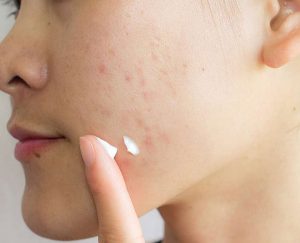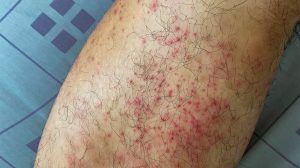When you catch a glimpse of yourself in a reflection, it’s not often your elbows or knees staring back at you.
Instead, it’s your face—the forefront of your identity, the part of you that meets the world first. And when that forefront is marred by dry, flaky skin, it can shake your confidence swiftly.
Dry skin, characterized by a rough, scaly texture and sometimes accompanied by itching and cracking, is a condition that can strike any part of the body. However, its presence on the face, the most visible and often scrutinized part of ourselves, can be particularly distressing.
This discomfort isn’t just a cosmetic concern.
It’s a sign that your skin, the body’s largest organ and its first line of defense against the environment, is under duress. It’s struggling to maintain the right balance of water and oils necessary for its health. This can result from a multitude of factors, including age, genetics, environmental conditions, and even your bathing routines.
Aging, for instance, naturally diminishes the oil production in skin pores, making dryness more prevalent as years pass. By the time we hit 60, most of us find ourselves battling with parched skin more often than not.
Furthermore, a familial history of skin conditions like eczema or allergic contact dermatitis increases the likelihood of perpetual dryness.
Your surroundings play a part too.
Those living in areas with seasonal climates will notice that the chillier autumn and winter months bring about a harsh drop in humidity, leaving the skin gasping for moisture.
Even your daily shower, a presumed sanctuary of rejuvenation, could be a culprit if it’s too hot or frequent, stripping your skin of its natural oils.
So, how do we tackle this dryness that seems almost inescapable, especially when it targets our faces?
The remedy starts in the cleaning aisle.
A common mistake is washing the face with the same harsh soaps designed for the hands or body. These soaps often contain sodium lauryl sulfate, a chemical that, while effective in ridding us of dirt and bacteria, is notoriously harsh on the skin. Its drying effect can be particularly pronounced on the face, which features more delicate skin.
Instead, consider investing in gentler, hydrating cleansers specifically formulated for the face, free from such harsh chemicals. Follow up with a rich moisturizer or an emollient like Epilyt lotion to lock in moisture. And let’s not forget hydration, the foundation of healthy skin. It is crucial that you get your daily quota of eight glasses of water.
Men, in particular, should heed their post-shave routine. Cheap aftershave lotions might have the same negative effect as harsh soaps, drying out the skin further. Opt instead for hydrating balms or aftershaves with nourishing ingredients.
It could be something serious, as well.
For severe or persistent dry skin, which might be a symptom of an underlying health condition like hypothyroidism or evolve into more serious skin conditions like xerosis, it’s important to consult a healthcare professional. They can provide an accurate diagnosis and a tailored treatment approach.
Moreover, while it’s common to experience more dryness with age, and women may see increased dryness post-menopause, these conditions don’t have to be accepted with resignation. With the right products, a balanced diet, and proper hydration, dry, flaky skin on the face can be addressed effectively.
To conclude, facing the world with vibrant, healthy skin is within reach.
It requires understanding the root causes of dry skin and taking proactive, consistent steps in skincare. So, the next time you catch your reflection in a passing window, it’s not dismay you’ll feel, but pride in the radiant skin you’ve nurtured.
For more information, visit Canadian Pharmacy





